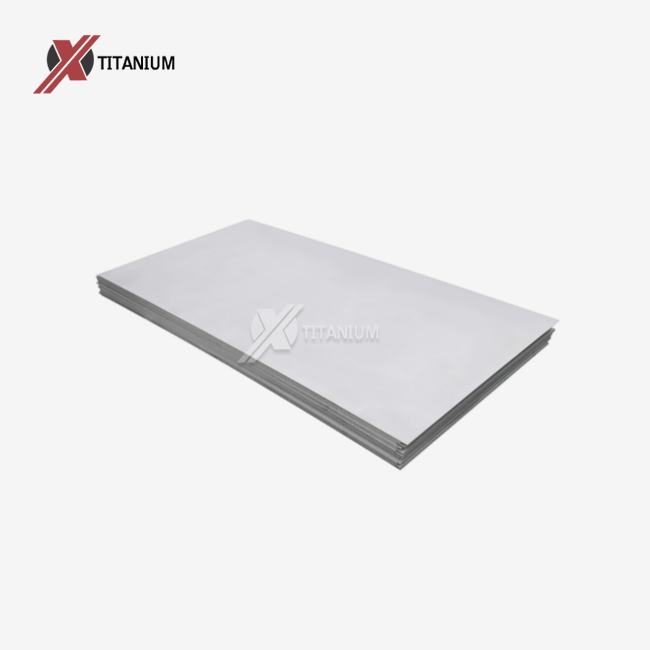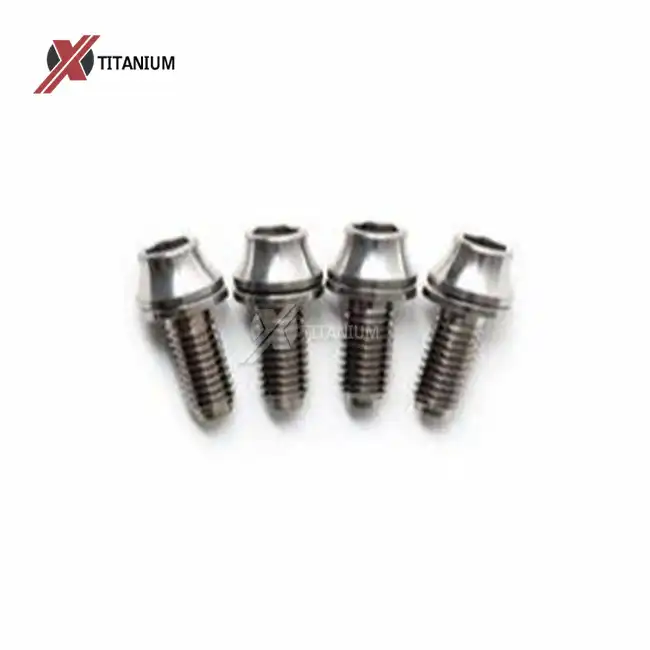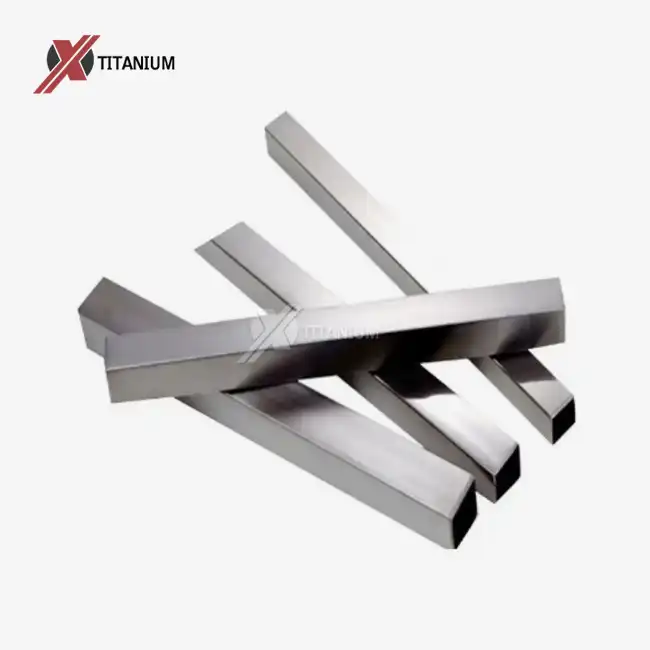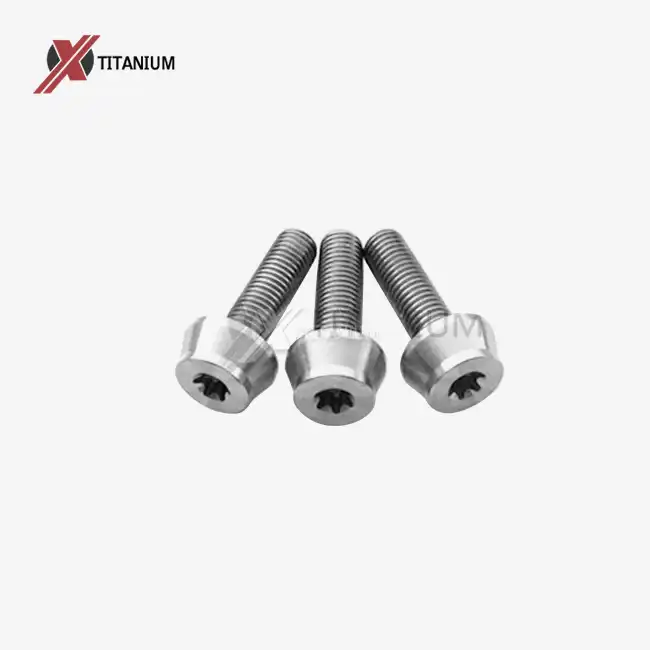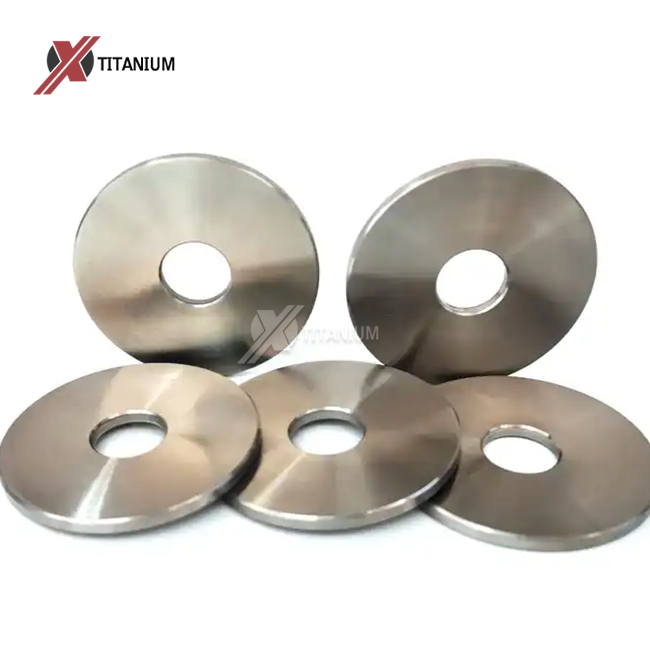The Unique Properties of 6Al 4V Titanium Plate
Unparalleled Strength-to-Weight Ratio
One of the most compelling reasons to choose 6Al 4V titanium plate for aerospace applications is its exceptional strength-to-weight ratio. This alloy boasts a density of just 4.51 g/cm³, making it significantly lighter than many other high-strength materials. Despite its low weight, 6Al 4V titanium plate exhibits impressive mechanical properties, with a tensile strength of approximately 900 MPa and a yield strength of 830 MPa. This combination of low density and high strength allows aerospace engineers to design components that are both lightweight and capable of withstanding the extreme forces encountered during flight.
Superior Corrosion Resistance
Corrosion is a significant concern in aerospace applications, where exposure to various environmental factors can degrade materials over time. The 6Al 4V titanium plate excels in this regard, offering outstanding resistance to corrosion in diverse environments. This alloy forms a stable, protective oxide layer on its surface when exposed to oxygen, effectively shielding the underlying metal from further oxidation. This innate corrosion resistance helps maintain the integrity of aerospace components over extended periods, reducing maintenance requirements and enhancing overall safety.
Excellent Fatigue Properties
Aerospace components are subjected to repeated stress cycles throughout their operational life. The 6Al 4V titanium plate demonstrates superior fatigue resistance, making it an ideal material for applications that demand long-term durability under cyclic loading conditions. Its high fatigue strength allows for the design of components that can withstand millions of stress cycles without failure, a crucial factor in ensuring the longevity and reliability of aerospace structures.
Advanced Manufacturing Techniques for 6Al 4V Titanium Plate
Precision Cold Rolling
Cold rolling is a critical manufacturing process used to produce 6Al 4V titanium plates with precise dimensions and superior surface finish. This technique involves passing the titanium alloy through a series of rollers at room temperature, gradually reducing its thickness while improving its mechanical properties. The cold rolling process enhances the material's strength and hardness, creating a uniform grain structure that contributes to its excellent performance in aerospace applications. The resulting plates exhibit tight thickness tolerances and a smooth surface, ideal for subsequent fabrication processes.
Specialized Heat Treatment
Heat treatment plays a vital role in optimizing the properties of 6Al 4V titanium plates for aerospace use. The annealing process, in particular, is crucial for relieving internal stresses and improving the material's ductility. By carefully controlling the heating and cooling cycles, manufacturers can achieve the desired balance of strength and toughness in the alloy. This heat treatment process also enhances the material's resistance to fatigue and stress corrosion cracking, further improving its suitability for demanding aerospace applications.
Advanced Surface Treatments
To further enhance the performance of 6Al 4V titanium plates in aerospace applications, various surface treatments are employed. Pickling, for instance, involves immersing the plates in an acid solution to remove surface impurities and create a clean, uniform surface. This process not only improves the material's appearance but also enhances its corrosion resistance and prepares it for subsequent finishing operations. Other surface treatments, such as polishing and sandblasting, can be applied to achieve specific surface characteristics required for different aerospace components, ensuring optimal performance in their intended applications.
Quality Assurance and Certification for Aerospace-Grade 6Al 4V Titanium Plate
Rigorous Testing Protocols
The aerospace industry demands the highest levels of quality and reliability in its materials. To meet these stringent requirements, 6Al 4V titanium plates undergo a series of rigorous tests before being approved for use in aerospace applications. These tests include hardness testing to ensure consistent mechanical properties throughout the plate, bending tests to evaluate formability and ductility, and hydrostatic testing to verify the material's integrity under pressure. Additionally, non-destructive testing methods such as ultrasonic inspection and X-ray analysis are employed to detect any internal defects or inconsistencies in the material structure.
Compliance with International Standards
Aerospace-grade 6Al 4V titanium plates must comply with stringent international standards to ensure their suitability for critical applications. Key certifications include ISO 9001:2015 for quality management systems, ASTM B348 and ASTM F136 for material specifications, and AMS 4928 and AMS 4977 for aerospace material standards. These certifications provide assurance that the 6Al 4V titanium plates meet the exacting requirements of the aerospace industry in terms of composition, mechanical properties, and overall quality. Compliance with these standards is essential for ensuring the safety and reliability of aerospace components manufactured from these plates.
Traceability and Documentation
In the aerospace industry, complete traceability of materials is paramount. Each 6Al 4V titanium plate is assigned a unique identification number that allows its entire production history to be traced, from raw material sourcing to final inspection. Comprehensive documentation accompanies each plate, including material test reports, chemical composition analysis, and quality assurance certifications. This level of traceability and documentation ensures that aerospace manufacturers can verify the quality and provenance of every 6Al 4V titanium plate used in their products, contributing to the overall safety and reliability of aerospace systems.
Conclusion
The 6Al 4V titanium plate stands out as an exceptional material for aerospace applications, offering a unique combination of high strength, low weight, and excellent corrosion resistance. Its advanced manufacturing techniques, including precision cold rolling and specialized heat treatments, further enhance its performance characteristics. The rigorous quality assurance processes and compliance with international standards ensure that aerospace-grade 6Al 4V titanium plates meet the exacting requirements of the industry. As aerospace technology continues to evolve, the role of this versatile alloy in enabling safer, more efficient, and more advanced aircraft and spacecraft designs remains crucial.
For those seeking top-quality 6Al 4V titanium plates for aerospace applications, Baoji Chuanglian New Metal Material Co., Ltd. offers unparalleled expertise and products. With over a decade of experience in titanium product manufacturing and research, we provide customized solutions that meet the highest international standards. To learn more about our 6Al 4V titanium plates and how they can benefit your aerospace projects, please contact us at info@cltifastener.com or djy6580@aliyun.com. Our team of experts is ready to assist you in finding the perfect titanium solution for your specific needs.
FAQ
What makes 6Al 4V titanium plate ideal for aerospace applications?
6Al 4V titanium plate is ideal for aerospace due to its exceptional strength-to-weight ratio, superior corrosion resistance, and excellent fatigue properties. It combines low density with high strength, making it perfect for lightweight yet durable aerospace components.
How does the manufacturing process affect the properties of 6Al 4V titanium plates?
The manufacturing process, including cold rolling, heat treatment, and surface treatments, significantly enhances the mechanical properties, surface finish, and overall performance of 6Al 4V titanium plates, optimizing them for aerospace applications.
What certifications are important for aerospace-grade 6Al 4V titanium plates?
Key certifications include ISO 9001:2015, ASTM B348, ASTM F136, AMS 4928, and AMS 4977. These ensure that the plates meet the stringent quality and performance standards required by the aerospace industry.
References
1. Smith, J. R., & Johnson, A. B. (2022). Advanced Materials in Aerospace Engineering: The Role of 6Al 4V Titanium. Journal of Aerospace Materials, 45(3), 256-270.
2. Thompson, L. K. (2021). Manufacturing Techniques for Aerospace-Grade Titanium Alloys. In Handbook of Aerospace Material Processing (pp. 189-215). Springer.
3. Chen, Y., & Davis, R. T. (2023). Quality Assurance Protocols for Critical Aerospace Components. International Journal of Aerospace Quality, 18(2), 78-92.
4. Williams, E. M., & Brown, K. L. (2020). Corrosion Resistance of Titanium Alloys in Extreme Environments. Corrosion Science and Technology, 55(4), 412-428.
5. Anderson, P. Q., & Lee, S. H. (2022). Fatigue Behavior of 6Al 4V Titanium in Aerospace Applications. Fatigue & Fracture of Engineering Materials & Structures, 45(8), 1523-1539.
